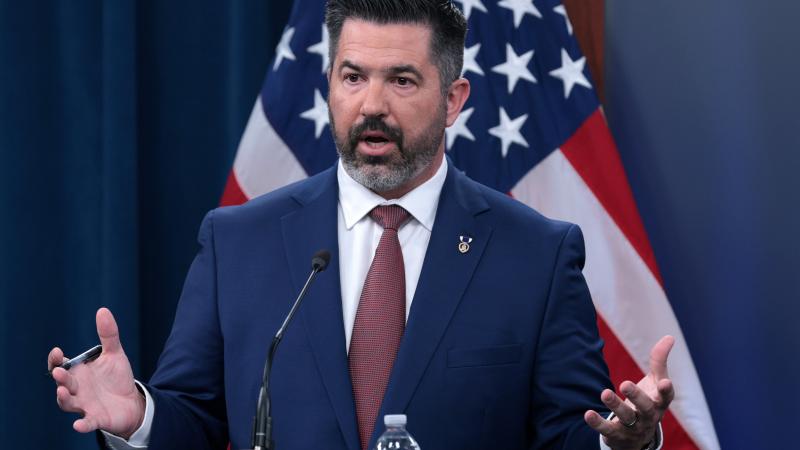Case of Chinese agent who created fake company leaves American consultants wary of spies
More than 400 people responded to the fake recruiting scheme that targeted consultants, according to the FBI.
A foreign man who recruited Americans to sell sensitive information to his bogus consulting firm is out of business and awaiting sentencing in the U.S. for being an unregistered Chinese agent. The man's case, while mostly concluded, has had a sobering effect on genuine consultants, who tell Just the News that in its wake they have grown vigilant against being preyed upon by spies.
"Consultants need to be aware," said Rick Pollak, president of the Boston-based Society of Professional Consultants. "If we caught one foreign agent, how many did we not catch?"
The man who was caught is Singapore national Jun Wei Yeo, who will be sentenced in October for being an agent of a foreign power without notifying the U.S. Attorney General.
"It's a startling case," Pollak said. "It looks as if someone planned it out very carefully."
As outlined in FBI charging documents, Yeo ran a complex scheme that revolved around recruiting independent consultants to serve as unwitting intelligence agents.
"In 2018, Yeo created a fake consulting company that used the same name as a prominent U.S. consulting firm that conducts public and government relations, and Yeo posted job advertisements under that company name," according to a statement from the Justice Department. "Ninety percent of the resumes Yeo received in response were from U.S. military and government personnel with security clearances, and he passed resumes of interest to one of the Chinese intelligence operatives."
Acting under orders from his intelligence bosses, Yeo pursued his quarry, according to the Justice Department.
"After Yeo identified American targets, he solicited them for non-public information and paid them to write reports," according to the statement. "Yeo told these American targets that the reports were for clients in Asia, without revealing that they were in fact destined for the Chinese government."
News about the operation came as a shock to the target community, who call themselves "solo professionals."
"A lot of consultants aren't aware that this sort of thing is happening," Pollak said. "They wouldn't realize that they are being asked to work for a foreign government."
Even if unaware, though, consultants who work in the security sector can protect themselves, one Florida-based independent advisor said.
"The first thing you have to do is vet the company," said Alex Morales-Hernandez, whose company, EEC Solutions, does work for military and security firms. "You have to see if they are legitimate, and are they legally doing business in the United States."
Foreign companies, or companies claiming to have federal contracts, must register or provide contract numbers, Morales-Hernandez said.
Yeo's targets may have been fooled because he recruited them under the name of a well known firm, according to the FBI. But some, the bureau suggested, may have been vulnerable because they were financially strapped — a situation that is becoming more common in the profession.
"The economy has shrunk, and a lot of consultants are out of work," Pollak said. "They need work, and might not be doing their due diligence in checking out a job offer."
More than 400 people responded to the fake recruiting scheme, according to the FBI. Some confided to Yeo that they were having financial problems - to which he offered a quick solution.
Yeo also had help from the referral system on a professional networking site where he placed ads.
"According to Yeo, the website's algorithm was relentless," the charging document reads. "Yeo checked the professional networking website almost every day to review the new batch of potential contacts suggested to him by the site's algorithm. Later, Yeo told U.S. law enforcement that it felt almost like an addiction."
Yeo's case echoes that against Russian citizen Maria Butina, who was deported from the U.S. in October after serving time behind bars. Both Yeo and Butina pleaded guilty not to espionage, but to the relatively lesser charge of being an unregistered foreign agent. Both cases were assigned to Judge Tanya Chutkan in the U.S. District Court for the District of Columbia.
Butina's efforts mostly consisted of influence operations waged via cozying up to the National Rifle Association. Yeo's method was far more direct, and employed a traditional type of intelligence-gathering.
Yeo's method could leave American targets subject to prosecution under circumstances that largely can be avoided, experts said.
"The FBI urges citizens, especially those holding security clearances, to be cautious when being approached by individuals on social media sites with implausible career opportunities," FBI Washington Field Office official Timothy R. Slater said in a statement.
To potential targets in the consulting world, Morales-Hernandez says: "Just do your homework."














